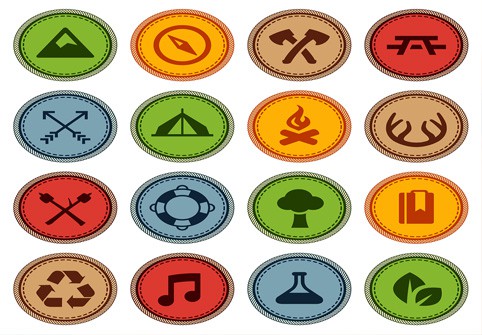Using Badges to Quantify Learning at UC Davis

“Using Badges to Quantify Learning Outcomes at UC Davis” by Courtney Buell first appeared on Edcetera.
Questions of legitimacy are currently keeping badges from being more widely adopted in higher education. The word “badge” itself calls to mind images of summer camps and knot-tying, not academic achievement.
But badges have the ability to communicate much more than a letter grade in an abbreviated course title. Badges could be the answer to unclear transcripts, and even be the solution to credit transfer problems between schools.
Logically, the objective for those wishing to further the badge concept is pursuing some sort of accreditation for a badge system, right? For answers, I sought out the badge expert at one of the only schools that is attempting to incorporate badges into their curriculum: UC Davis’ Joanna Normoyle.
Joanna is the Experiential and Digital Media Learning Coordinator for the Agricultural Sustainability Institute at UC Davis. Her badge concept won an award in the fourth Digital Media and Learning competition, and she has been working on building it out for the last two years. Students will experience the program for the first time this fall.
As someone who has managed to engage faculty and administrators in a dialogue about badges at a school like UC Davis, I felt like Joanna was uniquely qualified to offer some perspective on helping people in higher education see the value of badges. I asked her about the possibility of legitimizing badges through accreditation and her response surprised me. She said, “If badges became a replacement for grades, how would they change anything? If we left it at that, we’d be falling short of the real transformative work that badges make possible.”
She went on to explain that because badges are more flexible than transcripts and letter grades, the true measure of their worth is seen when they are applied to more abstract concepts, like school-wide learning outcomes.
What are Learning Outcomes?
In college, students learn how to structure a thesis in English 101 and how to identify the parts of a plant cell in Biology 101. This is certainly useful knowledge, but the most valuable things students learn in college are often much harder to quantify. Critical thinking, time management, collaborative skills, and effective research are implied with the issue of most bachelor’s degrees, but they’re a little harder to track on a transcript. This is where badges excel. Learning outcomes typically consist of abstract skill sets and that schools within a university hope their graduates achieve, and are designed to help faculty and students keep the big picture in mind when they’re in the throes of research papers and midterms.

System of Badges for Sustainable Agriculture & Food Systems Major at UC Davis
Badges and Learning Outcomes at UC Davis
The Agricultural Sustainability Institute at UC Davis is developing the badge system for an undergraduate major in Sustainable Agriculture and Food Systems. The major was designed to help students achieve learning outcomes like “Systems Thinking,” “Experimentation and Inquiry,” “Understanding Values,” and “Interpersonal Communication.” These outcomes will be acknowledged with badges. With the support of ASI, students in the major do a lot of hands-on learning on farms and throughout the food system, and while their knowledge of ecology and economics are certainly put to the test, they deserve acknowledgement for what they learn that can’t be assessed on an exam.
Enhanced Advising
Joanna also believes that learning outcome-based badge systems can make advising more powerful. She said, “We want our students to remember throughout their education that there are higher level competencies that span across all of the experiences they’re having in their course of study, and that they should keep in mind how they are developing overall.”
When students have specific badges attached to learning outcomes, it’s much easier for them to see the big picture, and for advisors and faculty to track how their students are progressing through the program. With badge-tracked learning outcomes, there’s potential for advising sessions to be pithier, and for student/faculty interactions to be better focused.
College transcripts could benefit from being more information-rich, like badges, but accrediting badges outright might neuter them of their ability to flex and quantify abstract learning outcomes. It might not necessarily be a bad thing for badges to be legitimized as part of an accredited system, but if that’s all we do with them, we’re missing out.






0 Comments
Leave a Comment
Your email address will not be published. All fields are required.